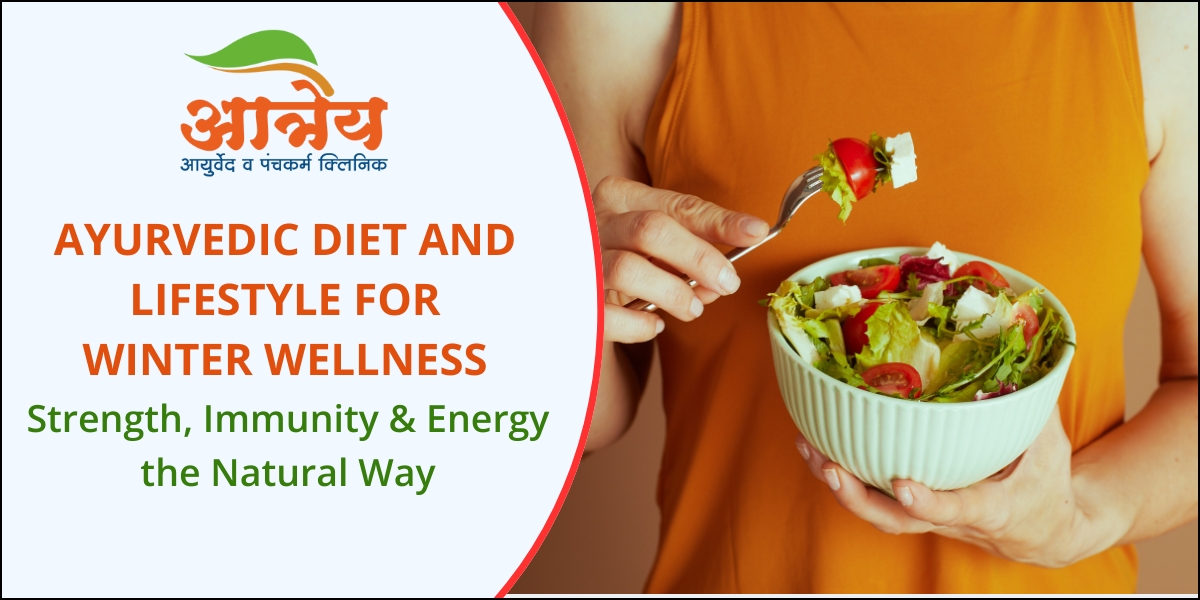Winter (Hemant Rutu) is known in Ayurveda as the season of strength. During this time, digestive fire (Agni) becomes naturally stronger, making the body capable of absorbing nutrition better than any other season. However, the cold, dry air and reduced sunlight can also increase Vata and Kapha, leading to joint pain, lethargy, colds, and low immunity.
With simple adjustments in diet and lifestyle, Ayurveda helps you stay warm, energetic, and disease-free throughout winter.
Ayurvedic Understanding of Winter (Hemant Rutu)
Ayurveda identifies winter as a period where:
- Vata dosha increases due to cold and dryness
- Kapha begins to accumulate due to cold, heavy atmosphere
- Agni becomes strongest, making it the best season for nourishment and Rasayana
This is the ideal time for strengthening immunity, building muscle, nourishing the skin, and rejuvenating the body.
Ayurvedic Winter Diet (Ahara) – What to Eat & What to Avoid
Foods to Include
These foods keep you warm, strong, and nourished:
- Ghee & sesame oil – improves digestion, lubricates joints, keeps skin hydrated
- Warm milk with spices (turmeric, nutmeg, cinnamon)
- Seasonal fruits – pomegranate, apple, papaya
- Nuts & seeds – almonds, walnuts, sesame seeds, pumpkin seeds
- Khichadi, moong soup, dal rice
- Vegetables – carrot, beetroot, sweet potato, ridge gourd
- Jaggery-based preparations – good for energy and warmth
- Herbal teas – ginger, tulsi, cinnamon, mulethi
Foods to Avoid
- Cold, refrigerated, or stale food
- Excess curd, cold milk, ice creams
- Raw salads in excess
- Aerated drinks and packaged juices
- Deep-fried and heavy, oily preparations
- Excess sweets (increase Kapha)
Ayurvedic Winter Lifestyle (Dinacharya)
1. Daily Abhyanga (Oil Massage)
Warm sesame oil or medicated oil massage improves circulation, reduces dryness, prevents stiffness, and boosts immunity.
2. Morning Sun Exposure
Spend 10–15 minutes in early sunlight for Vitamin D, improved mood, and immunity.
3. Regular Exercise & Yoga
Winter is the best season to build strength:
- Surya Namaskar
- Vajrasana, Trikonasana, Bhujangasana
- Light running or brisk walking
4. Steam Inhalation Once a Week
Helps prevent cold, sinus congestion, and respiratory infections.
5. Maintain Early Bedtime
Winter nights are longer — Ayurveda recommends sleeping early and waking early to sync with nature’s rhythm.
Winter Rasayana Herbs (under expert guidance only)
Rasayana is most effective in winter because the body absorbs herbal nutrients better.
- Ashwagandha – improves strength & immunity
- Amalaki (Amla) – antioxidant, rich in Vitamin C
- Guduchi – boosts immunity
- Pippali – supports digestion & respiratory health
- Gokshura – strengthens vitality
- Chyawanprash (classic winter Rasayana)
Ayurvedic Beauty Care for Winter
- Use sesame or almond oil for face and body massage.
- Apply ubtan to maintain glow.
- Avoid hot water directly on the face (causes dryness).
- Use ghee on lips before bed.
Winter is a season of rejuvenation. When you follow Ayurveda’s diet and lifestyle guidelines, you feel stronger, warmer, and more energized. With Rasayana therapy, nourishing foods, and disciplined routine, winter becomes the perfect time to rebuild immunity and vitality — the foundation of long-term health.
For a personalized winter Ayurveda & Rasayana plan, contact Aatreya Ayurved Clinic at 9860007992.
FAQs on Winter Wellness
Q1. Can I eat ghee daily in winter?
Yes, in moderation. Ghee enhances digestion, lubricates tissues, and boosts immunity.
Q2. Which tea is good for winter?
Ginger, tulsi, cinnamon, and mulethi teas help warm the body and improve immunity.
Q3. Is winter a good time for Panchakarma?
Certain Panchakarma therapies and Rasayana programs are especially beneficial in winter due to strong Agni.
Q4. How to avoid dry skin naturally?
Daily oil massage, ghee in diet, warm baths, and avoiding harsh soap help keep skin soft.






